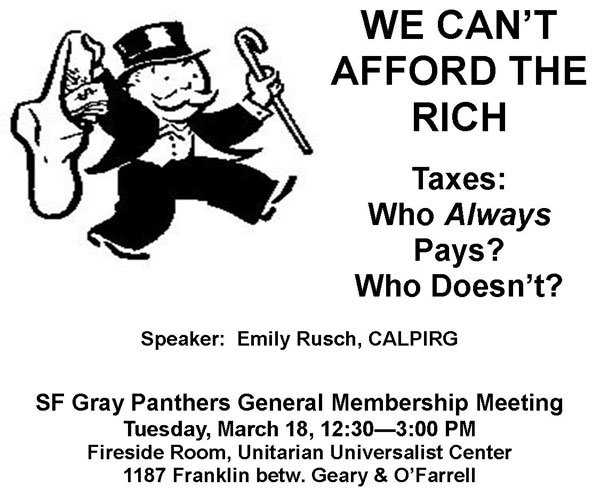

SF Gray Panthers General Meeting A Taxing Situation While most of us have been busy coping with our daily life survival, stressed by wars of invasion, wars on our streets, and erosion of our civil rights, the tax burden has increased on poor families and decreased for rich families. California has 95 billionaires worth $102.9 billion. Yet, hundreds with incomes above $200,000 pay no income tax at all. (more) The gap between our state’s rich and poor is becoming a canyon. Hourly wages of low-income workers over the last 30 years have dropped 7.2%. High earners wages have jumped 18.4%. The state’s top 1% saw their incomes rise 108% from 1995-2005. (much more) Nationwide, 36 million are living at or below the poverty level, about 1 in 8. (more) Schwarzenegger informs us that we have a $14.5 billion state deficit, and he will not raise taxes. He will not replace the $20 billion car tax he used to cement his first recall election. He says we have to make it easier for businesses and not punish them with regulations and more taxes. Those cries of “overtaxing” are mythological, for California places 19th in the country in terms of overall taxes. Instead our governor and many legislators butcher social services including: slashing MediCal; stealing millions from education funds that were guaranteed by Prop 98; and delaying cost of living increases on welfare payments. Read more on Schwarzenegger's proposed cuts. Read highlights of federal cuts. Fair Share—Share Fair Why is it always programs for people that take the budget cuts? Do we even need budget cuts? There is plenty of money to be shared or allocated, and over 70% of our citizens support raising the top rate on state income tax of the wealthiest residents. The tax rate on incomes over $275,000 in 1991 was 11% - now it is only 9.3%. For years, UCLA professor Paul O’Lague and Cal State professor John Bachar have advocated progressively raising taxes from 0.5% to 7% on the richest 3.1 percent of California tax payers (or the non-payers). That alone would raise close to $14 billion. If the same formula is applied to those with yearly incomes of $200,000 or more reaching 7% for those who make $5 million or more, the revenue increase would be more than $26 billion. (more) Inequality, Taxes and Electioneering There is widespread agreement among economists that inequality in the United States has increased hugely over the last 25 years. According to Dean Baker of the Center for Economic and Policy Research, the benefits of the 3.1 percent average growth rate in the GDP “have gone overwhelmingly to the richest 10 percent of families” and what few gains most households experienced were mainly from an increase in two-earner households. Baker believes “this upward redistribution has been largely driven by deliberate policy decisions”—in trade and immigration policies, in the Federal Reserve Board’s emphasis on keeping inflation under control over sustaining high levels of employment, in anti-union policies which have driven wages down, and in the increasing costs of health care that are a much greater burden for low and middle income wage earners. (more) And now, recession looms. Baker and economist John Schmitt predict a severe recession of three to four years, with huge job losses, a possible 5.8 million increase in unemployed (with a 41.4 percent unemployment rate among black teens), reduced family income, and even more people without health insurance. (more) This is an election year. Are the candidates who seek to run our country addressing these issues? What do we want to hear from them? One thing we’d like to hear on tax day this year is ideas for changes in the tax structure—like ending the Bush tax cuts, restoring the estate tax, raising the capital gains tax to previous levels or higher. Most people in the country pay more in payroll taxes (for Social Security and Medicare) than income tax, yet no one pays Social Security tax on income over $97,500. Remove the cap! And what about corporate taxes? Surely we can do better than just close a few loopholes. Corporate profits have been astounding in recent years. How about an excess profits tax? And a war profits tax? Let them give some of their obscene profits back to infrastructure and social services. Candidates, let’s hear it! Whatcha gonna do? Don't be shy. Where is all this change you're talking about?
What can you do? Feb. 29: Come to the People's Budget meeting to save City Services March 4: Speak out against the City Health Cuts
More Reading Read "The Mayor's Mid-Year Budget Cuts: Cruel and Unusual" Read "Plummeting Dollar, Credit Crunch .. Final Stop: Soup Kitchen USA" Read "Social Inequality Reaches New Heights in California" Read "Using Income Taxes (especially on the wealthy) to Address State Budget Shortfalls" (Another article on this.) Read "A Generation of Widening Inequality, the State of Working California, 1979 to 2006" (pdf) This page is based on SF Gray Panthers' March 2008 Newsletter. |
Phone: 415-552-8800, fax: 415-552-8801
e-mail: graypanther-sf@sbcglobal.net, web: http://graypantherssf.igc.org/
Location: Market Street, at Hyde and 8th Streets,
One door downtown from Orpheum Theater box office. Map
Surface transit: MUNI 5, 6, 7, 9, and 21 buses, and F streetcar
Underground transit: Civic Center Station for BART and MUNI Metro lines J, K, L, M, and N
For regular membership, committee, and Board meetings, click here.